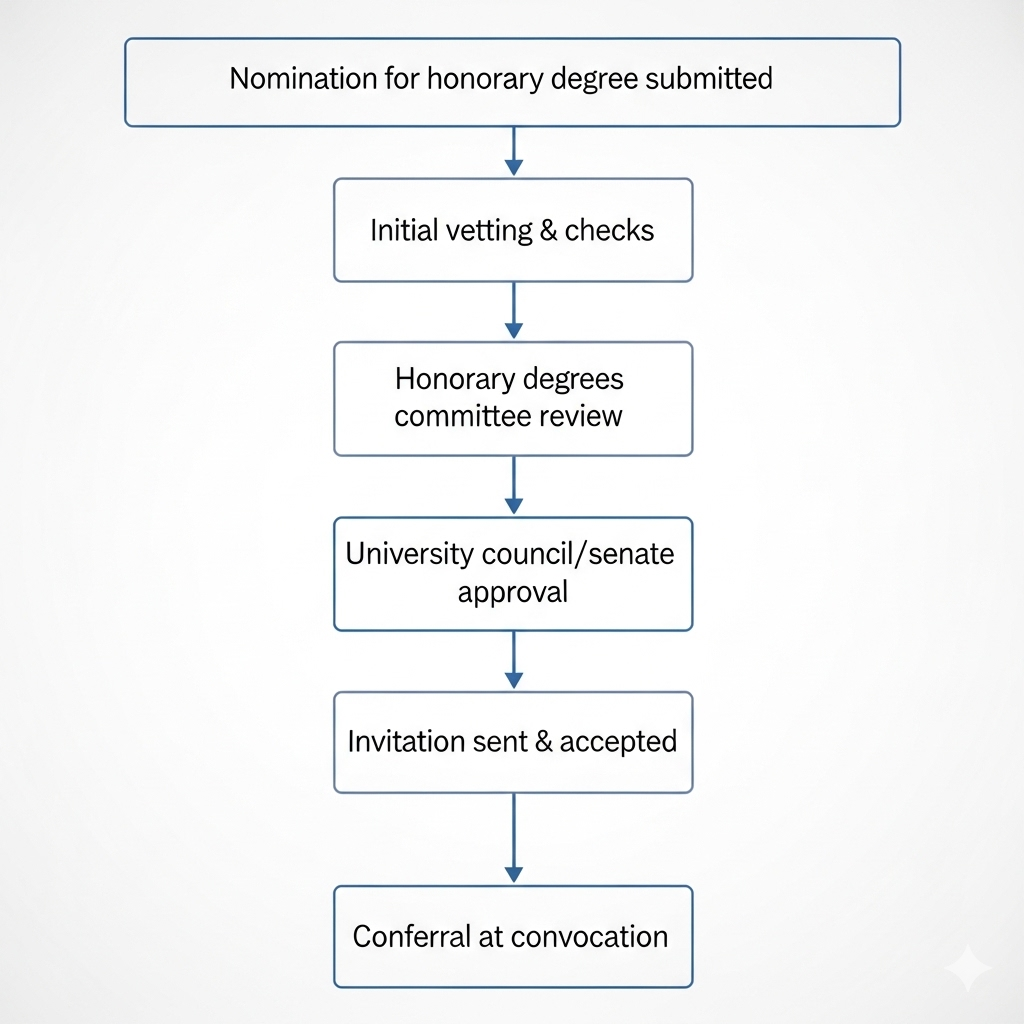How Honorary Doctorates Are Awarded: From Nomination to Convocation
Home / How Honorary Doctorates Are Awarded: From Nomination to Convocation
MANAGEMENT
Sep 15, 2025
An honorary doctorate is a degree that a university awards to honour a person who has made an outstanding contribution beyond the classroom. It could be given to a scientist who has revolutionised the way we view the world, an artist whose work has inspired millions, a public figure, or a person who has dedicated years to serving a charity.
It's not like a traditional doctorate degree, which involves years of rigorous research and study. An honorary doctorate is rather about recognising impact — a manner in which the university can officially honour an individual’s contributions and achievements.
In the sections ahead, we’ll follow the journey of an honorary doctorate: how a nomination is made, the checks and decisions that follow, and finally the graduation ceremony where the award is given. We’ll highlight the distinction between these honours and formal degrees and tackle common questions.
Who May Be Awarded an Honorary Doctorate?
Universities typically confer honorary doctorates on individuals of "conspicuous distinction"—those who have made a lasting contribution to society, knowledge, or culture. These might be:
- Authors, scientists, or artists whose writings or creations have a worldwide impact.
- Business leaders who have made enduring social or economic significance.
- Those who have dedicated themselves to causes that benefit communities or society at large.
- Alumni who have gained distinction and done their university proud.
It is not awarded for academic gain but to honour achievement and character.
Read also - Top Universities Awarding Honorary Doctorate Degrees Worldwide
How to Nominate Someone for an Honorary Doctorate?
Nominations usually come from the university community—staff, fellows, alumni, or members of governing bodies. However, the rules of eligibility for an honorary doctorate may vary. Some universities will only accept nominations from staff, college fellows, alumni or governing bodies, and others will have a broader range of proposer categories but still require senior academics to support a nomination. Nominations must usually make a clear case that the nominee's work is of lasting significance and that the public conduct of the person is consistent with the values of the university. A typical nomination includes:
- A completed form outlining the candidate’s achievements.
- Biographical information and evidence of impact.
- Letters of support or references.
- A senior academic or faculty member must provide their endorsement.
The focus must be on evidence and not solely on the reputation. Strong nominations describe how the candidate’s work aligns with the university’s values and benefits wider society.
Checks and Vetting
After a nomination has been submitted, administrative staff conduct some due diligence. This will include identity checks, checking public records, checking the media, and ensuring that there are no legal or ethical grounds that would render the award of any degree or honour inappropriate. Where required by policy, freedom-of-information or transparency provisions stipulate how nominations are recorded or published. Some universities do publish the lists of nominees under freedom-of-information rules after the award is made.
This stage is important because honorary awards are public acts. A university must be confident that a candidate’s reputation will not bring the institution into conflict or embarrassment.
Committee Review Process
Next, the nomination passes through one or more university committees. This often includes:
- A faculty or school-level committee.
- A central honorary degrees committee.
- Final approval by the university council or senate.
Committees consider what makes each nominee truly stand out, ensure fair representation across different fields, and take into account how many awards are planned for that year. Additionally, they consider many other important elements, including the public standing of nominees, what the students are gaining from such a nomination or research activity, and consonance with the mission of the university. Due to the sometimes sensitive nature of nominations, committees attempt to have specific, well-developed criteria and obtain independent opinions and ensure transparency in the process to minimise any perceived bias.
Approval and Invitation
If the committees agree, the nominee gets a formal invitation. Universities typically maintain confidentiality for names until an acceptance of the invitation has been made. The acceptance of the recipient is necessary, as the degree can only be awarded in person. Universities usually restrict the number of honorary degrees per commencement to maintain the award's dignity. In case no appropriate candidate is discovered, some institutions will not award any that year instead of compromising.
At this point, organisational matters like travel, ceremony arrangements, and publicity are organised.
Read also - Pursue Online Doctorate in Business Administration
The Convocation Ceremony
The award is typically presented at a convocation or graduation ceremony or a special meeting. In the UK, distinguished ceremonies like Oxford's Encaenia or Cambridge's graduation occasions are traditional times for conferrals. The recipient usually graduates in academic dress, receives the degree from the head of the university (e.g., the chancellor or vice-chancellor), and is usually asked to deliver an address. The ceremony is symbolic and formal: the university officially recognises the contribution of the individual and awards the degree honoris causa.
Universities make public lists of honorary degree graduates and have searchable records of previous recipients available. This is transparent and creates a public record for the honour.
Flowchart: How Honorary Doctorates are Awarded
After the Award Is Given
An honorary doctorate is symbolic, not academic. The honorary degree recipients may list it among awards but are normally advised not to use the title “Dr” in professional settings. The degree does not carry academic rights such as supervising students or granting qualifications.
Honorary vs. Earned Doctorate
|
Feature |
Honorary Doctorate |
Earned Doctorate |
|---|---|---|
|
How awarded |
Nomination & approval |
Years of study & research |
|
Purpose |
To honour achievement |
To prove scholarly expertise |
|
Use of title |
Symbolic only, not for daily use |
Full academic & professional use |
|
Ceremony |
Public conferral at graduation |
Graduation after study |
|
Time to achieve |
None |
3–7 years |
Timeline: From Nomination to Conferral
- Months 1–3: Nominations submitted and vetted.
- Months 4–6: Committee reviews and shortlist.
- Months 7–8: Governing body approval.
- Months 9–12: Invitation accepted and award conferred at graduation.
Conclusion
To conclude, awarding an honorary doctorate degree is a careful, multi-step procedure. It begins with a nomination, followed by checks, committee reviews, and formal approval. The award is normally conferred at convocation, where the recipient is publicly honoured for their contribution to society. Here are the steps involved while nominating an individual for an honorary doctorate:
- Nomination submitted.
- Vetting and checks carried out.
- Committees review and approve.
- The university council grants final approval.
- Invitation sent and accepted.
- Degree conferred at convocation.
An honorary doctorate is not a qualification but a symbol of respect and recognition — one of the highest marks of esteem a university can bestow.
Latest Updates & Articles
Stay Connected !! To check out what is happening at EIMT read our latest blogs and articles.








